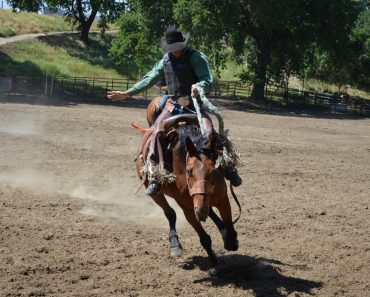It’s been more than 20 years since I took my first riding lesson, but some of it is still fresh in my mind. Most notably, I recall the mistakes I made: facing the rear of the horse rather than its front when picking up feet; leading and mounting from the left instead of the right; currying in a circular motion rather than up and down…
When it comes to making mistakes, having a thick skin is key. That was another thing I learned.
My first trainer was a basic training expert, and I have to believe those early lessons saved me from numerous hours of tacking problems, fights with my horses, and injuries – both to myself and to the animals. Horseback riding has been around for millennia, so it’s reasonable to assume they’ve had plenty of time to perfect their technique. If there’s a “correct” way to do anything these days, chances are it was discovered through the previous testing.
The problem is that if you start as a youngster and continue to ride on a regular basis or in competitions for 10 or 20 years, it’s easy to overlook these fundamental principles. You move up a few levels at horse shows, then suddenly realize things are starting to slip away. So, here’s a quick refresher course for people like myself who suffer from selective memory when it comes to the basics.
1. Mount it correctly.
If you haven’t seen a slow-motion video of your horse getting on, do so right now. There’s a reason why you should utilize a mounting block, keep your reins in hand, aim your toe away from the belly, and swing gently into the saddle as your pony camp instructor instructed. You’ll not only save your horse’s back but also avoid an unwanted dismount (or ten).
2. Reduce the reins’ length.
Whatever your level of experience, this is a never-ending struggle for some riders. Short reins aid in steering clear of other horses while remaining in the ring when you’re just beginning. When you’re fine-tuning your contact in the ring years later, you’ll be grateful for the training.
3. Keep an eye on where you’re going.
Not always. The more competent you become, the more distractions you’re likely to face. Chatting with a friend, listening to music, or conversing on the phone might appear to be a simple exercise until you ride in front of the beginner on her way to a jump or cut your trainer off on a green horse. It’s all fun and games until someone is bucked off.
4. Pass touching left hands.
You trained by high-fiving other lesson kids in the ring earlier today. Today, in a crowded horse show schooling ring, you put this information to use. At any degree, following the “rules of the road” is critical.
5. Keep enough distance between you and the other horses.
Horses may be herd animals, yet they all have their own preferences and dislikes. The more horses you ride, the easier it is to forget this fact. Giving your horse enough space to operate and reflect will not only make him happier, it will also keep you safe.
6. Horsemanship is required.
Hopefully, your riding lesson didn’t finish the moment you stepped out of the horse’s stirrups as a beginning rider. It shouldn’t, either, as a more experienced rider. Knowing all there is to know about your horse’s care and continuing your education outside the barn by reading books, viewing films, fitness training, and attending seminars will only help you get better at sports.
7. Expect the unexpected.
Your trainer probably instructed you to have eyes in the back of your head, and he or she was correct. The longer you work in this line of work, the more likely it is that you’ll meet someone who’s been seriously injured in a “freak” accident with horses, despite experience level. Accidents can happen while riding or dismounting, at any time and on any horse. It’s all too easy to get comfortable over time. Don’t do so.
8. Let your horse relax.
When you were a youngster, you patted your horse on the head for minor things like stopping straight and avoiding running away with you when you landed on his neck after a Crossrail… Years later, your expectations are most likely greater, which is why remembering this early lesson is even more vital. Whether at the pony ring or in the Grand Prix extension, don’t forget to appreciate your horse for doing his duty and keeping both of you safe.

